Dev Bentham's Blog, page 14
March 12, 2013
DABWAHA
 I’m a finalist – can you believe it? This is so exciting.
I’m a finalist – can you believe it? This is so exciting.
Here’s the whole list: http://dabwaha.com/2013/03/10/2013-finalists/
February 26, 2013
Stopping by character on a snowy evening
 I love romance. I rewrite the endings of movies in my head so that everyone gets their HEA. And yet, without winning characters, believable plots and clear prose, even I can get squeamish.
I love romance. I rewrite the endings of movies in my head so that everyone gets their HEA. And yet, without winning characters, believable plots and clear prose, even I can get squeamish.
I’ll forgive a lot for a good character. Or at least that’s what I tell myself. But you know, if the plot gets squirrelly who do I blame? First the author, of course, but after that I start thinking less of the character for showing up in this stupid plot. As for clear prose, how do I find out about this great character if I can’t understand the sentences, or if I’m constantly getting tripped up by jingly, jangly, dangly adjectives or metaphors that leap across the page like herds of delicate does prancing across a snowy field? Now you know why no one gets to read my first drafts.
A good character comes to life with simple words and propels himself/herself forward through a series of logically connected events. Which isn’t always as easy as it sounds. I just spent two days trying to decide if the guys in my WIP were the type to say no to sex (um, no) and whether there were any extenuating events that could logically keep them from doing the deed (are you kidding?). So now all I have to do is pry them apart and figure out what’s going to keep them out of bed long enough for me to finish the book. I’m thinking snow, maybe an avalanche – that’s a logical plot point, isn’t it? In the very flat Midwest?
Hmm. Maybe one of them will have to behave badly. After all, a good character doesn’t always do the right thing, or even do the wrong thing well, but if he’s going to mess up, it had better be in a way we can believe – and maybe come to love.
What do you think? What makes a character work or not work for you?
February 19, 2013
Interview with Jordan Castillo Price!
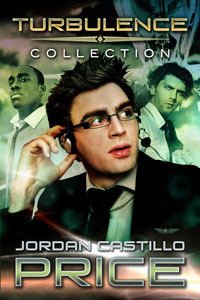 I’m incredibly excited to interview Jordan Castillo Price here today. She’s the legendary author of the hugely successful Channeling Morpheus and Psycop series, as well as amazing stand alone novels like Hemovore, Zero Hour, Starving Years and Magic Mansion (be still my heart) as well as being the visionary editor responsible for the Petit Morts with Josh Lanyon, Sean Kennedy and Clare London. Today she’ll be answering my questions about her newly completed series – Turbulence, and she’ll be giving away to one lucky commenter.
I’m incredibly excited to interview Jordan Castillo Price here today. She’s the legendary author of the hugely successful Channeling Morpheus and Psycop series, as well as amazing stand alone novels like Hemovore, Zero Hour, Starving Years and Magic Mansion (be still my heart) as well as being the visionary editor responsible for the Petit Morts with Josh Lanyon, Sean Kennedy and Clare London. Today she’ll be answering my questions about her newly completed series – Turbulence, and she’ll be giving away to one lucky commenter.
DEV: I’m always impressed by your ability to write a novel serially and have everything hang together with very little editing needed when you bring it all together at the end. Does your process writing this kind of book differ from how you write your other work? And do you think that writing chapters on a deadline for your newsletter has changed the way you write your other novels?
JORDAN: I think there’s definitely a difference, because when I release something serially and I discover a contradiction, I simply have to let it go and fix it in final edits, and presume my audience understands that the first release may have an inconsistency here or there.
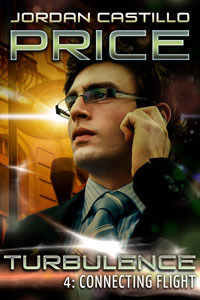 That said, I don’t deliberately contradict myself. In Turbulence, there’s an important rainbow sticker about 3/4 of the way through the series. If I’d been writing it as a novel rather than a serialized piece, I could have gone back and planted the sticker at the DC bar scene that happened in book 4. There’s a kid by the door and Paul hands him an awful martini as he storms out. If I could have gone back and added foreshadowing, I could’ve had the kid give him a sticker. Instead I had to explain the sticker on the spot in book 7, and it didn’t feel as integrated as it would have if I’d planted it earlier.
That said, I don’t deliberately contradict myself. In Turbulence, there’s an important rainbow sticker about 3/4 of the way through the series. If I’d been writing it as a novel rather than a serialized piece, I could have gone back and planted the sticker at the DC bar scene that happened in book 4. There’s a kid by the door and Paul hands him an awful martini as he storms out. If I could have gone back and added foreshadowing, I could’ve had the kid give him a sticker. Instead I had to explain the sticker on the spot in book 7, and it didn’t feel as integrated as it would have if I’d planted it earlier.
A story is really a series of causes and effects. The story feels more resonant when the causes are seeded early and play out in a satisfying way throughout the piece. I suppose writing serially has made me appreciate that when writing novels I have the ability to go back and weave in new parts of the story as they occur to me so they feel predestined.
DEV: Dallas and Paul are both really sweet guys and I love how well suited they seem. There are so many nice balances between them like that while Paul has the higher income job, Dallas has much more experience on this particular spooky flight. How do your characters come to you – are they fully formed when they arrive in your head or do you build them more consciously?
JORDAN: Your question is interesting because there are things that could be seen as differences, but you see them as balances. Maybe difference and balance are two sides of a coin. I think neither of them would be much attracted to someone like themselves. They need contrast, difference and balance.
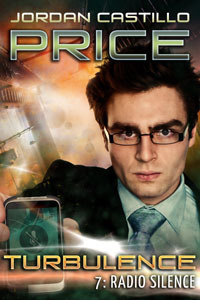 When I create a new character, they aren’t exactly fully-formed, but I start them off with some key personality traits that I’m dogged about remaining faithful to. Dallas, at heart, is a competent caretaker, and Paul is a tightly-wound skeptic with something to prove. Being super clear on a character’s core can often make it seem as if I’ve spent ages fleshing them out. I find that pre-fleshing a character, as some writing workbooks might have you do by subjecting them to a lengthy and arbitrary character interview, is actually counterproductive. It takes the life and discovery out of putting the character through their paces.
When I create a new character, they aren’t exactly fully-formed, but I start them off with some key personality traits that I’m dogged about remaining faithful to. Dallas, at heart, is a competent caretaker, and Paul is a tightly-wound skeptic with something to prove. Being super clear on a character’s core can often make it seem as if I’ve spent ages fleshing them out. I find that pre-fleshing a character, as some writing workbooks might have you do by subjecting them to a lengthy and arbitrary character interview, is actually counterproductive. It takes the life and discovery out of putting the character through their paces.
DEV: It’s rare to read a story in which race is handled with subtlety and grace. It seems to me you’ve done that with Dallas and Paul. Can you talk about that aspect of the relationship, what it was like to write it and how readers have responded to the subtle and overt racism exhibited by various characters in the series?
JORDAN: Early readers wanted me to tone down the racial aspect, but I felt that by having Paul and Dallas encounter resistance to their budding relationship, I was honoring the reality. Later readers let me know they thought I hit the right balance. I’d say the racism was mostly subtle, mostly matter-of-fact, at least until Paul introduces his racist drinking friend to his new black boyfriend. That conversation was maybe 300 words long and took me two days to write, because it was so crucial to have it be as perfectly insulting and horrible as it needed to be.
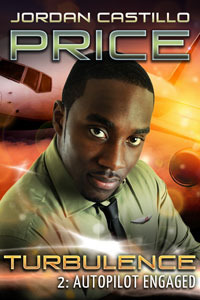 DEV: Dallas is a caretaking type of guy – he raised his niece and he takes care of the pilots when they’re in alternate Bermuda. How do you see that changing on the few occasions when Dallas climbs in the cockpit for the turbulence and alternate Dallas ends up in Bermuda?
DEV: Dallas is a caretaking type of guy – he raised his niece and he takes care of the pilots when they’re in alternate Bermuda. How do you see that changing on the few occasions when Dallas climbs in the cockpit for the turbulence and alternate Dallas ends up in Bermuda?
JORDAN: I think alternate-Dallas still takes care of people, but in an entirely different and much sassier way. He’s probably responsible for providing free mimosas for the passengers. Probably with Paul’s money.
DEV: The whole situation challenges Paul much more than Dallas, not just because he’s new to it, but because it shakes up his view of the world. And in turn his skepticism is the hardest thing about him for Dallas. What would you like your readers to take away from that dynamic?
JORDAN: I think we need to allow our friends to be who they are. Basing your approval of someone on whether they’ll change for you is a sure way to end up with a lot of resentment down the road. Paul and Dallas would not have been compatible, ultimately, if Paul remained an atheist, because faith is simply too important for Dallas. But the shift from atheist to agnostic is actually enough to bring them into alignment.
DEV: Marlin – he’s the joker in the deck, a secondary character so important he gets his own cover. Marlin’s already dead by the time Paul enters the story, and yet Paul’s relationship with Marlin changes over the course of the series. Does that mirror Paul’s personal development and what influence do you think Marlin has the story even though he’s absent? In other words, could you talk about Marlin for a little bit?
JORDAN: I’ve been thinking about it and I think Marlin may actually be the antagonist. His intent isn’t malicious and he isn’t actually present, but his past actions create conflict after conflict for Paul, every step of the way.
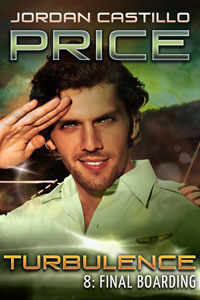 Marlin shapes the whole story, no doubt. Having him kill himself in the first scene set a certain tone: that the story would be intense. That stakes were high. And, for the people who paid attention to his emotional state, that something very weird was going on.
Marlin shapes the whole story, no doubt. Having him kill himself in the first scene set a certain tone: that the story would be intense. That stakes were high. And, for the people who paid attention to his emotional state, that something very weird was going on.
The Paul/Marlin relationship doesn’t have a gradual arc. It has a pronounced shift, a kind of epiphany, in the final book. There’s a moment where Paul realizes they’re not opposites at all, as he’d been presuming, and that in fact they’re a lot alike. That realization mirrors his relationship with Dallas, I suppose. It reflects that they’re different, but in the ways that are important, they’re in synch.
Thanks so much for having me over to chat about the Turbulence series, Dev, it was fun! And I’d also like to give away an ebook copy of the Turbulence Collection to one of the commenters, so if you’re reading, be sure to comment!
I’m incredibly excited to interview Jordan Castillo Price...
 I’m incredibly excited to interview Jordan Castillo Price here today. She’s the legendary author of the hugely successful Channeling Morpheus and Psycop series, as well as amazing stand alone novels like Hemovore, Zero Hour, Starving Years and Magic Mansion (be still my heart) as well as being the visionary editor responsible for the Petit Morts with Josh Lanyon, Sean Kennedy and Claire London. Today she’ll be answering my questions about her newly completed series – Turbulence, and she’ll be giving away to one lucky commenter.
I’m incredibly excited to interview Jordan Castillo Price here today. She’s the legendary author of the hugely successful Channeling Morpheus and Psycop series, as well as amazing stand alone novels like Hemovore, Zero Hour, Starving Years and Magic Mansion (be still my heart) as well as being the visionary editor responsible for the Petit Morts with Josh Lanyon, Sean Kennedy and Claire London. Today she’ll be answering my questions about her newly completed series – Turbulence, and she’ll be giving away to one lucky commenter.
DEV: I’m always impressed by your ability to write a novel serially and have everything hang together with very little editing needed when you bring it all together at the end. Does your process writing this kind of book differ from how you write your other work? And do you think that writing chapters on a deadline for your newsletter has changed the way you write your other novels?
JORDAN: I think there’s definitely a difference, because when I release something serially and I discover a contradiction, I simply have to let it go and fix it in final edits, and presume my audience understands that the first release may have an inconsistency here or there.
 That said, I don’t deliberately contradict myself. In Turbulence, there’s an important rainbow sticker about 3/4 of the way through the series. If I’d been writing it as a novel rather than a serialized piece, I could have gone back and planted the sticker at the DC bar scene that happened in book 4. There’s a kid by the door and Paul hands him an awful martini as he storms out. If I could have gone back and added foreshadowing, I could’ve had the kid give him a sticker. Instead I had to explain the sticker on the spot in book 7, and it didn’t feel as integrated as it would have if I’d planted it earlier.
That said, I don’t deliberately contradict myself. In Turbulence, there’s an important rainbow sticker about 3/4 of the way through the series. If I’d been writing it as a novel rather than a serialized piece, I could have gone back and planted the sticker at the DC bar scene that happened in book 4. There’s a kid by the door and Paul hands him an awful martini as he storms out. If I could have gone back and added foreshadowing, I could’ve had the kid give him a sticker. Instead I had to explain the sticker on the spot in book 7, and it didn’t feel as integrated as it would have if I’d planted it earlier.
A story is really a series of causes and effects. The story feels more resonant when the causes are seeded early and play out in a satisfying way throughout the piece. I suppose writing serially has made me appreciate that when writing novels I have the ability to go back and weave in new parts of the story as they occur to me so they feel predestined.
DEV: Dallas and Paul are both really sweet guys and I love how well suited they seem. There are so many nice balances between them like that while Paul has the higher income job, Dallas has much more experience on this particular spooky flight. How do your characters come to you – are they fully formed when they arrive in your head or do you build them more consciously?
JORDAN: Your question is interesting because there are things that could be seen as differences, but you see them as balances. Maybe difference and balance are two sides of a coin. I think neither of them would be much attracted to someone like themselves. They need contrast, difference and balance.
 When I create a new character, they aren’t exactly fully-formed, but I start them off with some key personality traits that I’m dogged about remaining faithful to. Dallas, at heart, is a competent caretaker, and Paul is a tightly-wound skeptic with something to prove. Being super clear on a character’s core can often make it seem as if I’ve spent ages fleshing them out. I find that pre-fleshing a character, as some writing workbooks might have you do by subjecting them to a lengthy and arbitrary character interview, is actually counterproductive. It takes the life and discovery out of putting the character through their paces.
When I create a new character, they aren’t exactly fully-formed, but I start them off with some key personality traits that I’m dogged about remaining faithful to. Dallas, at heart, is a competent caretaker, and Paul is a tightly-wound skeptic with something to prove. Being super clear on a character’s core can often make it seem as if I’ve spent ages fleshing them out. I find that pre-fleshing a character, as some writing workbooks might have you do by subjecting them to a lengthy and arbitrary character interview, is actually counterproductive. It takes the life and discovery out of putting the character through their paces.
DEV: It’s rare to read a story in which race is handled with subtlety and grace. It seems to me you’ve done that with Dallas and Paul. Can you talk about that aspect of the relationship, what it was like to write it and how readers have responded to the subtle and overt racism exhibited by various characters in the series?
JORDAN: Early readers wanted me to tone down the racial aspect, but I felt that by having Paul and Dallas encounter resistance to their budding relationship, I was honoring the reality. Later readers let me know they thought I hit the right balance. I’d say the racism was mostly subtle, mostly matter-of-fact, at least until Paul introduces his racist drinking friend to his new black boyfriend. That conversation was maybe 300 words long and took me two days to write, because it was so crucial to have it be as perfectly insulting and horrible as it needed to be.
 DEV: Dallas is a caretaking type of guy – he raised his niece and he takes care of the pilots when they’re in alternate Bermuda. How do you see that changing on the few occasions when Dallas climbs in the cockpit for the turbulence and alternate Dallas ends up in Bermuda?
DEV: Dallas is a caretaking type of guy – he raised his niece and he takes care of the pilots when they’re in alternate Bermuda. How do you see that changing on the few occasions when Dallas climbs in the cockpit for the turbulence and alternate Dallas ends up in Bermuda?
JORDAN: I think alternate-Dallas still takes care of people, but in an entirely different and much sassier way. He’s probably responsible for providing free mimosas for the passengers. Probably with Paul’s money.
DEV: The whole situation challenges Paul much more than Dallas, not just because he’s new to it, but because it shakes up his view of the world. And in turn his skepticism is the hardest thing about him for Dallas. What would you like your readers to take away from that dynamic?
JORDAN: I think we need to allow our friends to be who they are. Basing your approval of someone on whether they’ll change for you is a sure way to end up with a lot of resentment down the road. Paul and Dallas would not have been compatible, ultimately, if Paul remained an atheist, because faith is simply too important for Dallas. But the shift from atheist to agnostic is actually enough to bring them into alignment.
DEV: Marlin – he’s the joker in the deck, a secondary character so important he gets his own cover. Marlin’s already dead by the time Paul enters the story, and yet Paul’s relationship with Marlin changes over the course of the series. Does that mirror Paul’s personal development and what influence do you think Marlin has the story even though he’s absent? In other words, could you talk about Marlin for a little bit?
JORDAN: I’ve been thinking about it and I think Marlin may actually be the antagonist. His intent isn’t malicious and he isn’t actually present, but his past actions create conflict after conflict for Paul, every step of the way.
 Marlin shapes the whole story, no doubt. Having him kill himself in the first scene set a certain tone: that the story would be intense. That stakes were high. And, for the people who paid attention to his emotional state, that something very weird was going on.
Marlin shapes the whole story, no doubt. Having him kill himself in the first scene set a certain tone: that the story would be intense. That stakes were high. And, for the people who paid attention to his emotional state, that something very weird was going on.
The Paul/Marlin relationship doesn’t have a gradual arc. It has a pronounced shift, a kind of epiphany, in the final book. There’s a moment where Paul realizes they’re not opposites at all, as he’d been presuming, and that in fact they’re a lot alike. That realization mirrors his relationship with Dallas, I suppose. It reflects that they’re different, but in the ways that are important, they’re in synch.
Thanks so much for having me over to chat about the Turbulence series, Dev, it was fun! And I’d also like to give away an ebook copy of the Turbulence Collection to one of the commenters, so if you’re reading, be sure to comment!
February 14, 2013
Jordan Castillo Price – here 3/20
She’ll be talking about the Turbulence series and giving away a copy of the Turbulence Collection.
In honor of my first blog guest AND to warm things up for her, I’ll be doing a giveaway myself. Leave a comment between now and Tuesday (3/19) for a chance at an ebook of your choice from my backlist.
And come back on Wednesday for a fabulous interview with JCP!
February 12, 2013
Show me
Happy Valentine’s Day– you know I’m all about the love story

photo by emdot (flickr creative commons)
Elizabeth Bernstein has an article in the Wall Street Journal about the different ways of we can express our love.
I’m a words kind of girl so I tend to say “I love you” too soon and too often, a trait that’s gotten me into trouble over the years. But I have to admit that I’m more likely to feel loved when my significant other does the dishes or rubs my back or scrapes snow off my windshield. And I’m likely to swoon when he makes me coffee and delivers it in bed. That’s real love.

photo by chichacha (flickr creative commons)
Clara Smith, a blues singer from the 20′s, was right – we all deserve someone to grind our coffee.
I’m feeling the love right now because next week Jordan Castillo Price is coming here to talk about her Turbulence series. I can’t believe I just said that and it’s true – JCP here on February 20th! And she’ll be giving away a copy of the Turbulence Collection to one lucky commenter. Whoo hoo!
So look for that. And in the meantime – do something nice for the ones you love. Just because.
January 12, 2013
Thinking back
In my lifetime we’ve made a lot of progress.
When I was born, Jim Crow segregation laws poisoned the U.S. south, although Rosa Parks had already ignited a firestorm by refusing to give up her bus seat. Homosexuality was illegal in all 50 states and it was still kosher to pay women less than men for the same job. This month our black president has chosen a gay Latino poet to read at his second inauguration. In Obama’s first term 43% of his appointees were women. The new United States congress opens with a record number of out LGB members and Tammy Baldwin as the first openly gay senator. Okay, Obama’s second term cabinet could be more diverse – but I was born during Eisenhower’s second term and that cabinet was all white, all male and all purportedly heterosexual
There’s still a long way to go. Unemployment among young black men is staggering, wages are still stratified by race and gender, we have record income inequality, there’s been an upsurge in membership in extreme racist groups and last month the Southern Poverty Law Center reported hate crimes against gays from Washington DC to California. But it gives me hope to pause for a moment and reflect on all the changes that have occurred in the last 50 plus years. Equity seemed an impossible dream when I was a child, now it feels like a reasonable goal.
January 1, 2013
Happy New Year

Photo by monkeyc.net (Flickr Creative Commons)
I like to spend New Year’s Eve writing a gratitude list for all the good things that came my way during the past year. My 2012 list was long and full. It was a remarkable year for me. My first m/m novel came out in March, followed in quick succession by four more books. I’ve learned a great deal in the year and a half since I signed my first contract. I’m incredibly grateful to the publishers, editors and writer friends who have helped me shape the stories and launch them into the world. Special thanks to Larke Butler, my Loose Id editor, Rhonda Helms at Carina and the incomparable Jordan Castillo Price. And readers. Oh my, what a blessing. When I started, one of my goals was to be read by people I hadn’t met. Not only has that happened, but I’ve been heartened by the response. The year ended with a bang as Sacred Hearts earned two (2!) five star reviews – Mrs Condit and Friends Read Books and Book Reviews and More by Kathy. I couldn’t ask for a better way to ring out the old year.

Photo by John Lester (Flickr Creative Commons)
Writing fiction is a leap of faith where you do your best to render the images in your mind and toss them out for other people to interpret. Hearing from readers has allowed me to discover how well that transmission worked. Sometimes beautifully (almost everyone who read it seemed to love the setting in August Ice as much as I did) and other times not so well (the infamous cucumber scene in Learning from Isaac, got it – no more vegetables in the bedroom).

Photo by Andy2Boyz (Flickr Creative Commons)
I’ve grown a lot as a writer this year. Each story I release seems to me to be more mature than the last. I hope you all agree.
I wish you all a happy, healthy, rewarding 2013.
December 13, 2012
The Next Big Thing Blog Hop
The lovely and talented Kari Gregg tagged me in The Next Big Thing Blog Hop and I couldn’t be more flattered. I just finished her Christmas Story – I Don’t: A Christmas Wish – it’s heartwarming, funny and a great way to honor the Marriage Equity revolution. She talked about it here – check it out.
 Me, I have a holiday story coming out next week and it absolutely feels like my Next Big Thing so that’s what I’d like to talk about today.
Me, I have a holiday story coming out next week and it absolutely feels like my Next Big Thing so that’s what I’d like to talk about today.
1. What is the working title of your book? Sacred Hearts.
2. Where did the idea come from for the book?
This is the third book in Turbulent Souls, a series of interlocking love stories centered around Jewish holiday themes. The stories were written be read in any order because the holidays come around in a perpetual circle. If you’re Jewish, it’s always a holiday somewhere, right?
 Last spring I got the chance to spend a week in Puerto Vallarta, Mexico, a gay friendly paradise on the central Pacific Coast. I’ve always wanted to write “on location”. I started the novel before we left and worked on it between visits to the beach, the market and great local restaurants. The story, which is the MOST romantic thing I’ve ever written, naturally grew out of that sensory feast.
Last spring I got the chance to spend a week in Puerto Vallarta, Mexico, a gay friendly paradise on the central Pacific Coast. I’ve always wanted to write “on location”. I started the novel before we left and worked on it between visits to the beach, the market and great local restaurants. The story, which is the MOST romantic thing I’ve ever written, naturally grew out of that sensory feast.
3. What is the genre of the book? Contemporary m/m romance.
4. Which actors would you choose to play your characters in a movie rendition?
I envision the narrator, David as a young Stanley Tucci. I’d cast John as Hugh Dancy without the accent (although I do love that accent – did you see him in Hysteria? You gotta love a comedy about the invention of vibrators).
5. What is the one-sentence synopsis of your book?
After his ex sends him spinning into bankruptcy, David goes to Mexico for a job catering a movie set and there he falls for the literal man of his dreams.
6. Will your book be self-published or represented by an agency/publisher?
It’s coming out from Loose Id on December 18th.
7. How long did it take you to write the first draft of your manuscript?
It seemed like a long time. My normal process is to binge-write for two or three weeks to  get out the first draft, let that incubate for a month or so and then begin editing. For Sacred Hearts, I kept getting interrupted, so it took much longer. I started in March, wrote the first third during that week long vacation in Mexico and came home to two straight months of edits of other manuscripts. Then the summer arrived and that’s a time of predictable chaos for me. I finally got the manuscript to my editor the second week in September
get out the first draft, let that incubate for a month or so and then begin editing. For Sacred Hearts, I kept getting interrupted, so it took much longer. I started in March, wrote the first third during that week long vacation in Mexico and came home to two straight months of edits of other manuscripts. Then the summer arrived and that’s a time of predictable chaos for me. I finally got the manuscript to my editor the second week in September
8. What other books would you compare this story to within your genre?
I tend to take on subjects that aren’t commonly dealt with in erotic romance. The other m/m romances I’ve read that are set in Mexico have been romantic suspense rather than simple romance. And for some reason bankruptcy doesn’t seem to be a common romantic trope. But there are some great Hanukkah stories out there. Amara Astrid has a bunch out and they’re always fun. The tone of my work is probably closer to Harper Fox’s Nine Lights over Edinburgh (although Mexico is warmer than Scotland at Hanukkah time). And of course, the book has similar themes and interwoven characters with the other books in the Tarnished Souls series, Learning from Isaac and Fields of Gold.
9. Who or what inspired you to write this book?
 Mexico inspired me – here’s a passage from the book. The narrator has spent the night, as I did, in a village a few miles down the coast from Puerto Vallarta:
Mexico inspired me – here’s a passage from the book. The narrator has spent the night, as I did, in a village a few miles down the coast from Puerto Vallarta:
A cacophony of birds woke me. The light was still dim and the bed empty. As I emerged from the mosquito netting, the jungle around the hut sounded alive with birdsong. I inhaled the smell of lush green vegetation. In the distance, I could hear waves crashing against the surf. From the village came the sound of crowing roosters. Down below, a man leading a donkey was wading across the river.
Who could not find that landscape inspiring? And romantic. And sexy.
10. What else about your book might pique the reader’s interest?
Aside from the gorgeous setting, I’m hoping readers will be intrigued by the holiday theme. Both Christmas and Hanukkah happen in this book. It’s been a hard past few years for my heros and the winter holidays signal a return to happiness and light.
Oh, and there’s a lot of sex. It probably has something to do with the climate.
This has been fun. I tag Larry Benjamin. If you haven’t read his What Binds Us, check it out. I just bought Damaged Angels and I’m anxious to read it soon. The man has a beautiful way with words.
Larry Benjamin’s Blog (look for his Next Big Thing Blog sometime on or around 12/20) and his webpage.
And a happy, happy Hanukkah to all
December 10, 2012
Tarnished Souls 3: Sacred Hearts coming soon
 Sacred Hearts – the third book in the Tarnished Souls series – comes out from Loose Id on 12/18. Between now and then, I’ll be posting the first chapter serially on Facebook. Here’s today’s segment – come to my FB page over the next week to read the rest.
Sacred Hearts – the third book in the Tarnished Souls series – comes out from Loose Id on 12/18. Between now and then, I’ll be posting the first chapter serially on Facebook. Here’s today’s segment – come to my FB page over the next week to read the rest.
Chapter One
It was eight o’clock on an otherwise normal Sunday night. I’d just started table four’s entrées when my phone buzzed.
“David Schwartz?” Whoever she was, she sounded young.
“What can I do for you?”
Her voice was gravelly. “Rick Miller’s your business partner, right?”
“Yes.” And more. My stomach clenched. What had he done now?
“I’m a dealer at Fortuna’s. I shouldn’t be calling you, but I think you should come get him.”
I opened my mouth to speak, but the phone went dead.
He was gambling again. F*ck.
Sunday nights I cooked alone. The only other chef, the one who worked with me on weekends and covered two midday shifts, was busy throwing our money away. I stared at the food sizzling on my grill. Across the room, Billy rinsed and loaded a short stack of dishes. The door opened behind me, and young Fred stepped in, his tray piled with vinaigrette-stained salad plates.
I waved him over. “We’re closing early. Lock the door, turn off the outside light, and tell Charmaine to close as soon as these guys are finished.”
Billy looked up from the dishes. He wiped his stubbled face with the sleeve of his shirt. “What’s up, boss?”
I shook my head. “Something I need to take care of.” I looked at the half-cooked food, grilling prawns, a couple of salmon fillets, and a steak. Getting them plated would take me five minutes, max. How much damage could he do in five?
Charmaine arrived at my elbow as I garnished the last of the plates. “Why are we closing?”
I hung up my chef’s coat. “Rick’s at Fortuna’s.”
All the sweetness drained from her honey-brown skin. “I thought he quit.”
Anger rolled around in my gut like a roulette wheel. I shook my head. “Evidently he started again.”
She gave a curt nod and began stacking plates up her arm.
I bolted out the back door and sprinted toward my car.




